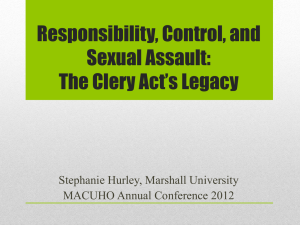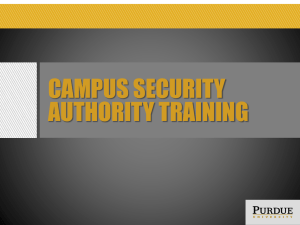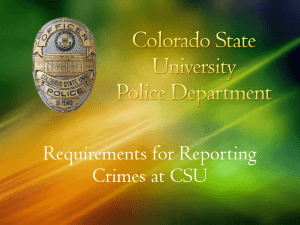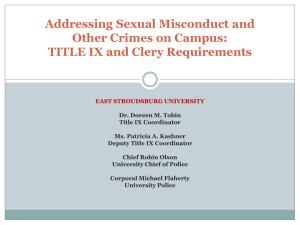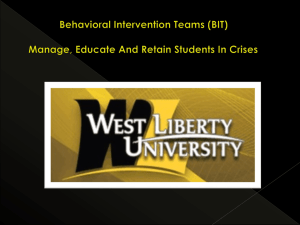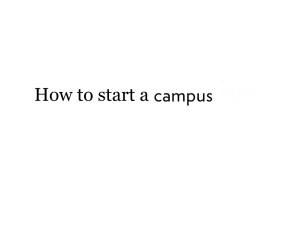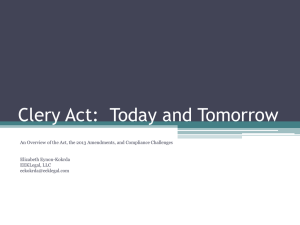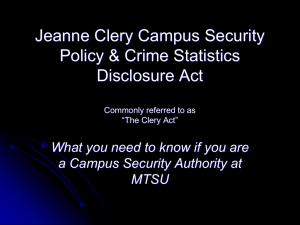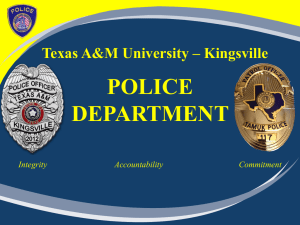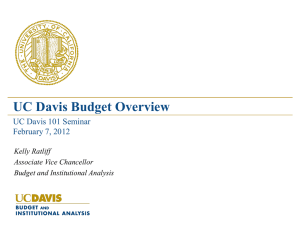Campus Security Authorities.
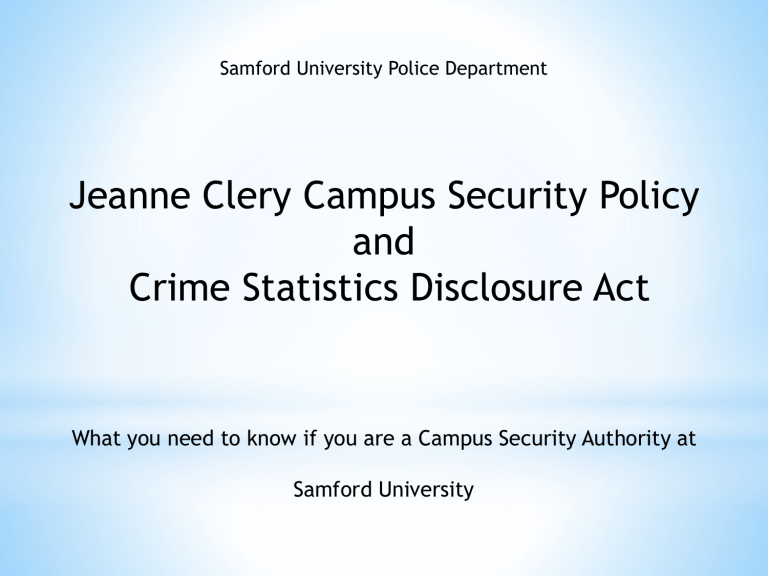
Samford University Police Department
Jeanne Clery Campus Security Policy and
Crime Statistics Disclosure Act
What you need to know if you are a Campus Security Authority at
Samford University
What is the Clery Act?
•Jeanne Clery was sexually assaulted and murdered in her dorm room at Lehigh University in 1986. The law, enacted in her memory, is intended to ensure that students and others are informed about violent campus crimes so they can make informed decisions.
•The Clery Act requires that universities report crime statistics to current and prospective students and employees.
What does it have to do with You
?
• Many crimes, especially sexual assaults, are not reported to police.
• The Clery Act requires that we gather and publish crime data to ensure that students and others know about dangers on campus.
• Data is collected from a wide variety of “ Campus Security
Authorities .”
This is where you come in.
What makes you a Campus Security Authority?
The Clery Act regulations define four categories of
Campus Security Authorities:
•University Police
•Non-police staff responsible for campus security, like monitoring the entrance into University property
•People/offices designated under our policy as those to whom crimes should be reported
•Other “Officials with significant responsibility for student and campus activities”
Responsible for campus security
•University Police (SUPD)
•Non-police security staff who: Events on campus
• Monitor/control entrance to property:
•Residence Hall security staff: RA’s
•Building security staff: Building Coordinators
• Provide special event security: EOG
• Provide campus safety escorts
Designated persons to whom crimes should be reported
:
For emergencies and crimes in progress: Call
205-726-2020, 9-1-1, or use the nearest
Emergency Blue Phone.
For non-emergency situations,
Samford University Police Department:
205-726-2020
How did you get to be a
Campus Security Authority?
The last category of “Campus Security Authority” (CSA) is defined broadly to ensure complete coverage and thorough reporting of crimes.
Many SU staff and faculty are CSA’s having “significant responsibility for student and campus activities” – including you.
Examples of “Campus Security Authorities”:
Campus Police/Security Pastoral Counselor
Dean of Student Affairs Athletic Coach
Faculty Advisor Resident Assistant
University President Access Monitor
Contract Security Officers Victim Advocate
Greek Affairs Coordinator On Campus Physician
Counselor Counselor Assistant
Staff Designated by University
Defined by function, not title:
•Significant responsibility for student AND campus activities
•Contact with students
Who is not considered a
Campus Security Authority:
•Administrative staff NOT responsible for students (e.g., payroll, facilities)
•Clerical staff
•Individual faculty who do NOT serve as an advisor to a registered student organization
•Doctors in the Student Health Center, or Counselors in the
Counseling Center who only provide care to individual students.
Who is EXEMPT from reporting requirements:
• Licensed professional mental health counselors (such as those in our Student Health Center)
• Pastoral counselors (employed by a religious organization to provide confidential counseling)
• Who are working within the scope of their license or religious assignment at the time they receive the crime report.
Confidential reporting option:
•SU encourages professional and pastoral counselors, although not required to report crimes, to tell victims about the Confidential Reporting Process. The counselor must make a judgment call: is it appropriate to discuss crime reporting in this particular situation?
•Confidential Reporting Process: victims can report crimes confidentially (no names or criminal investigation) to be included in crime statistics.
So you’re a CSA – what do you have to do?
If someone tells you about a crime or an incident that may be a crime, you must record the information and submit a report.
Just get the facts, experts will do the analysis.
When in doubt, report it!
WHAT do you have to report?
These crimes must be reported (definitions follow):
•Criminal homicide
•Sex offenses, forcible & non-forcible
•Aggravated assault
•Robbery
•Burglary
•Motor vehicle theft
•Arson
WHAT do you have to report? (continued)
You must also report:
• Hate crimes, including any of the seven crimes listed above, and any incidents of Larceny-Theft, Simple Assault,
Intimidation or Destruction/Damage/Vandalism of
Property that were motivated by bias
Timing is critical
Be sure to document:
•When and Where the crime or incident occurred;
•When it was reported to you.
The law requires that the crime be reported for the calendar year in which it was first reported to a
Campus Security Authority – not when it occurred, not when it was reported to police.
Location, location, location
A crime must be reported if it occurred:
•On campus
•In on-campus student residences (even if privately owned & operated)
•On public property adjacent to campus (e.g. roads, parking lots, sidewalks)
•On certain off-campus property (non-campus buildings or property)
Location (continued)
Under the law, some off-campus locations are deemed so closely related to the University that crimes occurring at those locations are included in campus crime statistics.
Examples:
Crimes occurring at registered student organization properties
Crimes occurring at University owned or controlled facilities “frequently used by students”
Location (continued)
These off-campus properties are termed “non-campus property,” and are defined by regulations to include:
•Property owned, leased or controlled by SU that is
•used in direct support of, or in relation to, SU’s educational purposes,
•frequently used by SU students, and
•not within the same reasonably contiguous geographic area of SU.
•Property owned or controlled by a student organization registered with SU (e.g. a fraternity)
Don’t include crimes not connected to
Samford University
For example,
•A student tells you about a crime that occurred at a different college before he transferred to SU; or
•A student reports an assault that happened while she was away from campus and not involved in a campus activity – e.g., at home on spring break, on vacation, or at a summer job with a private company
But DO tell the student about reporting options, and refer for help
For example,
A student tells you that she was sexually assaulted by another student at her off-campus apartment.
Although the crime did not occur at a location covered by Clery reporting, the accused student IS subject to University disciplinary action for this off-campus conduct.
In addition, the victim is eligible for campus assistance and resources. (See Title IX Sexual Misconduct Policy in the student handbook for how to report sexual assault, sexual violence or sexual harassment & policy information)
Just get the facts
Remember: your job is to record the information the person is willing to tell you and to ensure that it is reported.
Remember:
•You are not a detective;
•You don’t have to prove what happened, who was at fault, or classify the crime;
•You aren’t supposed to find the perpetrator.
When using the report form, please identify the person reporting the incident, unless they specifically request to remain anonymous.
Describe options
•Let the person know about options for reporting to police.
• Inform her/him about the confidential reporting process.
•BUT: The decision isn’t yours; a person who talks to you may not want to talk to police, and they don’t have to.
Offer referrals to campus and other resources, including:
•Campus victims’ assistance programs;
•Title IX Coordinator and Deputy Coordinators for sexual assault, sexual violence and other harassment;
•Designated Harassment Resource Persons for harassment based on any protected status (race, national origin, sex, sexual orientation, religion, disability, etc.)
•Office of Judicial Affairs to file Code of Student Conduct charges against another student;
•Available medical treatment; and
•Counseling services for students at University Health Center.
Document & report the facts
•Complete a Crime Report Form.
•If the person does NOT want to report to police, inform her/him that you MUST report the incident as an anonymous statistic, but will not identify anyone involved (you may need to wait until the reporting party leaves).
Filling out the Crime Report form:
•Available on the Public Safety website .
Campus Security Incident Form
•Describe the incident or crime:
•Answering questions on form will help police determine correct category;
•Get as accurate and complete a description of what happened as you can;
•Even incomplete information can help
.
The questions:
•Is a violent crime in progress? (If so, call police immediately at 205-
726+-2020 or 9-1-1)
•Has the victim sought or is the victim in need of assistance/services?
•What happened? How, when, and where did it happen? Is there an identified suspect?
•Has the incident been reported to police or to another CSA?
•Does the victim wish the report to remain confidential?
Filling out the form: (you’re not the expert, and you don’t have to be)
•You don’t have to be a criminal lawyer or know the classification;
•Just indicate the crime that seems most likely or possible;
•The campus Clery reporting coordinator will ensure that the crimes are classified and reported correctly.
Filling out the form:
The crimes:
•Criminal Homicide: murder, non-negligent manslaughter, and negligent manslaughter (including vehicular manslaughter).
•Aggravated Assault: unlawful attack upon another for the purpose of inflicting severe or aggravated bodily injury (usually accompanied by use of weapon or means likely to produce death or great bodily harm).
•Includes assault with disease (when offender is aware that he/she is infected with a deadly disease and deliberately attempts to inflict the disease by biting, spitting, etc.)
Filling out the form: The crimes
The crimes
•Sex Offenses, forcible and non-forcible
•Forcible sex offenses: rape, sodomy, sexual fondling, sexual assault with object, date or acquaintance rape.
•Example: A female student reports that her ex-boyfriend had sex with her in her campus residence hall room while she was unconscious after a night of drinking alcohol
•Example: A male student reports that another male student fondled him in a campus building
•Non-forcible: unlawful non-forcible sexual intercourse: statutory rape and incest
•
Questions on Sex Offenses
•Was crime committed forcibly/against victim’s will?
•Was victim incapable of giving consent because of temporary/permanent mental/physical incapacity, or because underage?
Filling out the form:
The crimes
•Robbery
•Taking/attempting to take something of value from the care, custody, or control of a person by force or threat of force or violence and/or by putting victim in fear.
•Questions on Robbery
•Was force or a weapon used or threatened?
•Was victim injured?
•Did victim feel fearful, threatened or endangered ?
Filling out the form:
The crimes
• Burglary
•Unlawful entry into a structure to commit a felony or a theft.
•Questions on Burglary
•Was item taken from inside dorm room, office, store, lab, or other structure?
•Was structure, room, store, or office open, closed, or locked?
•How did thief get into the structure/ room etc.?
Filling out the form:
The crimes
•Motor vehicle theft: theft or attempted theft of automobiles, trucks, motorcycles, motorized wheelchairs, etc., including “joyriding” (taking by person without lawful access).
•Arson: any willful or malicious burning or attempt to burn, with or without intent to defraud, a dwelling house, public building, motor vehicle or aircraft, or personal property of another.
Filling out the form:
The crimes
•Hate crimes: any of the above seven crimes or any incidents of
•Larceny-Theft (the unlawful taking, carrying, leading, or riding away of property from the possession or constructive possession of another)
•Simple Assault (an unlawful physical attack by one person upon another where neither the offender displays a weapon, nor the victim suffers obvious severe or aggravated bodily injury involving apparent broken bones, loss of teeth, possible internal injury, severe laceration, or loss of consciousness)
•Intimidation (to unlawfully place another person in reasonable fear of bodily harm through the use of threatening words and/or other conduct, but without displaying a weapon or subjecting the victim to actual physical attack), or
•Destruction/Damage/Vandalism of Property (to willfully or maliciously destroy, damage, deface, or otherwise injure real or personal property without the consent of the owner or the person having custody or control of it)
•That were motivated, in whole or in part by offender’s bias
•Bias is preformed negative opinion or attitude toward a group of persons based on their race, gender, religion, disability, sexual orientation, or ethnicity/national origin.
•
Remember: It is the perception of the offender, not the perception of the victim, that determines whether a
crime is classified as a Hate Crime.
Filling out the form:
The crimes
•Hate crimes to property, questions:
•Was the target personal property a personal residence, house of worship, or ethnic organization?
•Did the incident involve any expression of hatred (e.g. graffiti, comments) re: race, gender, ethnicity, religion, sexual orientation, or disability?
•Did any personal injury result from the incident?
Filling out the form:
The crimes
Liquor, drug, and weapon law violations:
•Police report statistics on arrests for liquor, drug, and weaponsrelated crimes.
•Student housing and student judicial affairs report statistics on disciplinary referrals for drug, liquor, and weapon law violations
(except when the student was also arrested for the same act).
•Statistics must reflect number of persons involved (head count), not just number of incidents.
Practical guidance:
WEAPON LAW VIOLATION – The violation of laws or ordinances prohibiting the manufacture, sale, purchase, transportation, possession, concealment, or use of firearms, cutting instruments, explosives, incendiary devices or other deadly weapons
Practical guidance: Report arrests and disciplinary referrals for any violation of a law regulating weapons.
DRUG ABUSE VIOLATION – The violation of state and local laws prohibiting the production, distribution and/or use of certain controlled substances and the equipment or devices utilized in their preparation and/or use. The unlawful cultivation, manufacture, distribution, sale, purchase, use, possession, transportation or importation of any controlled drug or narcotic substance.
Practical guidance: Report arrests and disciplinary referrals for any violation of a law regulating drugs, regardless of the type of drug.
LIQUOR LAW VIOLATION – The violation of state or local laws or ordinances prohibiting the manufacture, sale, purchase, transportation, possession or use of alcoholic beverages, not including driving under the influence and drunkenness . Includes furnishing liquor to a minor or underage possession.
Practical guidance: Report actual arrests and disciplinary referrals for violation of the liquor laws listed in the definitions. Do not report arrests or referrals for liquor offenses that violate University policy but do not break the law. For example, do not report a referral of a student who is of drinking age but has violated a
University policy against drinking in a specific location.
Samford University Child Protection Policy
•Alabama law makes the reporting of known or suspected child abuse or neglect mandatory for various members of the University’s community, including but not limited to: teachers, school officials, law enforcement, medical professionals, and any other person called upon to render aid or medical assistance to a child.
•It is the University’s position that all University personnel should immediately report known or suspected child abuse or neglect directly to Samford University Police
Department at 205-726-2020 or 9-1-1.
Samford University Child Protection Policy
•This policy applies to child abuse or neglect that allegedly occurs on the University’s campus, on property owned or leased, or while
University personnel are participating in a University connected activity off campus.
• A child is defined as a person under the age of eighteen (18) years of age.
•Negligent treatment includes the failure to provide adequate food, medical treatment, supervision, clothing, or shelter.
•Child abuse can be physical, emotional or sexual and no form of child abuse will be permitted or tolerated under any circumstances.
Samford University Child Protection Policy
Reporting Procedures:
•If you suspect that a child is a victim of child abuse or neglect, you must:
•First, immediately report the information to SUPD at 205-726-2020 or 9-1-1. Your oral report should include all available information about the child, possible injuries to the child, and the who, what, when, where, how, and why of what happened.
•Second, do not directly question or solicit information from the child. Your role is to report the information to the appropriate personnel.
•Third, in addition to making an oral report, you must also complete the Child
Abuse or Neglect Report Form (located on the Public Safety website) and deliver it to either SUPD or the Alabama Department of Human Resources.
Form
Samford University Child Protection Policy
•Any person who makes a good faith report of child abuse or neglect shall not be subjected to retaliation. Further, any person or entity that makes a good faith report of child abuse or neglect is immune under Alabama law from any liability, civil or criminal, that might otherwise be incurred or imposed.
Samford University CSA Test
1. CSA Stands for?
1. Campus States of America
2. Campus Security Authority
3. Call Students Absent
4. Don’t know
2. When talking with students about a Clery reportable incident. The forms are located on?
1. Samford University website
2. Internet under CSA
3. Resident Life website
4. Public Safety website
3. Licensed professionals working within the scope of their license or religious assignment are EXEMPT from
reporting requirements.
1. True
2. False
3. Don’t know
4. When talking with students about a Clery reportable incident we have to inform him/her about the confidential reporting process?
1. True
2. False
3. Don’t know
5. It is the perception of the ________ that determines whether a crime is classified as a Hate Crime.
1. Victim
2. Values Advocate
3. Public Safety
4. Offender
5. Don’t now
